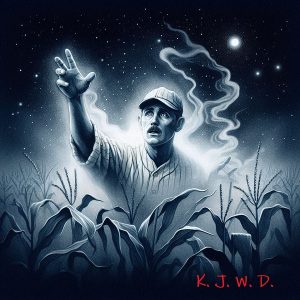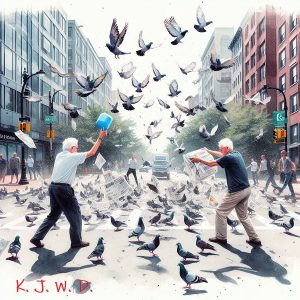The Ghost From The Cornfield
How I Stopped Smoking
By Kevin J. W. Driscoll (c) 2025
The flickering TV screen illuminated the dimly lit living room. I was mesmerized, watching Shoeless Joe Jackson in Field Of Dreams glide across the makeshift baseball diamond, the cornstalks swaying gently in the summer breeze. Then, it happened.
Another figure emerged from the rustling cornfield, a gaunt, hollow-eyed man with a desperate look in his eyes. He stumbled towards Ray Kinsella the farmer, his hand outstretched.
“Got a smoke, Ray?” he rasped, his voice a hoarse whisper.
The man’s desperation, his gaunt face, his eyes pleading for relief – it struck a chord deep within me. This wasn’t just a character in a movie; this was a chilling glimpse into the potential consequences of addiction.
Here, trapped in a timeless limbo, was a man forever bound to his craving, forever haunted by the ghost of nicotine. The thought sent a shiver down my spine. Was this my fate? Was I destined to spend eternity craving that fleeting, addictive supposed pleasure?
The image of the ghostly smoker, forever reaching out for a cigarette that would never come, became a powerful motivator. It was a stark reminder of the insidious nature of addiction, a warning that the consequences could extend far beyond the physical damage.
From that moment on, quitting smoking became more than just a matter of improving my health. It became a matter of escaping a potential eternity of craving. It was time to break free from the chains of addiction that threatened to bind me forever.
The journey was not easy. The cravings hit hard, unexpected waves of desire crashing over me. The ghost of nicotine, ever-present, whispered temptations in my ear, promising fleeting moments of solace. There were times when I almost succumbed, when the allure of a single cigarette seemed to outweigh the fear of eternal servitude.
But I remembered the gaunt face of the ghostly smoker, his eyes pleading for release. I remembered the chilling realization that addiction could transcend death, that the cravings could persist in a chilling, eternal limbo.
And so, I persevered. I walked more, I ate healthier, I filled my days with activities that kept my mind occupied. I sought support from friends and family, and I learned to recognize the triggers that unleashed the ghost of nicotine.
Slowly, gradually, the cravings subsided. The phantom limb twitched less frequently, the whispers grew fainter. I began to breathe easier, to sleep more soundly.
Years later, the memory of the ghostly smoker still lingers, a poignant reminder of the dangers of addiction. But now, instead of fear, it fills me with a sense of accomplishment. I have broken free from the chains that bound me, escaped the clutches of the ghost of nicotine, and reclaimed my freedom.
The ghost of addiction may still linger, a faint echo of a past I no longer recognize, but I am no longer its prisoner. I am free.
—30–




